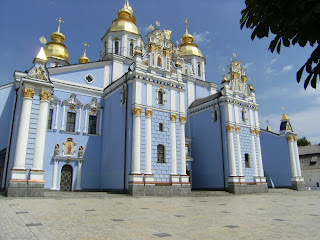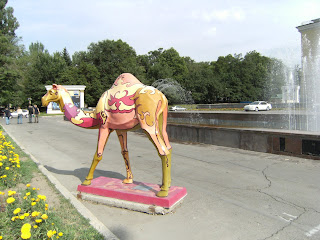 I was booked on the overnight bus out of Dubrovnik going direct to Skopje. Heading off down the coast before night the panarama was spectacular and I had one more short sea experience on the ferry.
I was booked on the overnight bus out of Dubrovnik going direct to Skopje. Heading off down the coast before night the panarama was spectacular and I had one more short sea experience on the ferry.Managed to sleep on and off and in between naps I produced my passport several times--I lost count after a while. I didn't need any visas and as long as it came back to me, I didn't care who stamped it.
For once this trip I was most assuredly going in the right direction. We encountered huge lines of traffic coming in the opposite direction at every immigration point, but no delays for us.
After a long night crossing three countries, winding our way through the mountains of Montenegro, we pulled into Skopje early Saturday morning. With only a three-day time window before my flight out of Athens back to Thailand, I checked first off on transport options. Three times weekly (Monday, Wednesday and Friday) there is a bus out to Thessaloniki. That cuts it close, but is still doable, so I booked a seat straight off for the Monday bus. That gives me two full days to explore Skopje, a completely random added extra venue on my itinerary. An unplanned surprise that turned out to be a gem.
For once this trip I was most assuredly going in the right direction. We encountered huge lines of traffic coming in the opposite direction at every immigration point, but no delays for us.
After a long night crossing three countries, winding our way through the mountains of Montenegro, we pulled into Skopje early Saturday morning. With only a three-day time window before my flight out of Athens back to Thailand, I checked first off on transport options. Three times weekly (Monday, Wednesday and Friday) there is a bus out to Thessaloniki. That cuts it close, but is still doable, so I booked a seat straight off for the Monday bus. That gives me two full days to explore Skopje, a completely random added extra venue on my itinerary. An unplanned surprise that turned out to be a gem.
Founded in the 3rd Century BC, it was under Roman rule from 148 BC. In it's newer history it was part of the Ottomen Empire for over 500 years (since 392 AD), and the ancient center has a very Turkish feel. Captured by Serbs before WW I, and under Bulgarian occupation during WW II, it became part of Yugoslavia following the war.
Situated on the Vardar River, the old district has both ancient Roman aqueducts and notable buildings from the Ottoman era. Skopje is purported to be the birth place of the Byzantine Emperor, Justian.
Two nice hostels not far apart from each other nor far from the central area. Great Turkish coffee in the old quarter, and the reccommended meal is kabab. Succulent and spicy grilled ground lamb rolls served with small roasted red peppers. Good local beer to wash it down.

I went to the National Museum where they gave me a New Year Greeting card in four languages as my entry ticket. Small eclectic collection in a spectacular building.
Early Monday morning I boarded the mini-van going to Thessaloniki. Still within the limitations of my tight schedule. It's the bane of solo travelers that the new era of steep [read astronomical] flight costs require advance booking with no change options, as I hate traveling with urgent deadlines. I would love to stay on in Macedonia and go out to Okra Lake, but it has to wait until next visit.









 First glitch came during the Paris-Munich leg of the journey when we encountered a 3-hour delay in the night. Seems a freight train blocked the tracks. I woke up in the night and realized we were not moving. How long we'd been stopped I had no way of knowing, but as time dragged on it became obvious I would miss my connection. Not a troubling thought in train rich Europe, so I soon went back to sleep with a clear mind. Last year when I missed a connection in France due to a train delay I was bumped up to first class. Perhaps that would be the case again.
First glitch came during the Paris-Munich leg of the journey when we encountered a 3-hour delay in the night. Seems a freight train blocked the tracks. I woke up in the night and realized we were not moving. How long we'd been stopped I had no way of knowing, but as time dragged on it became obvious I would miss my connection. Not a troubling thought in train rich Europe, so I soon went back to sleep with a clear mind. Last year when I missed a connection in France due to a train delay I was bumped up to first class. Perhaps that would be the case again. Situated at the confluence of the Nive and Adour rivers, Bayonne has the longest tradition of bullfighting in France. No surprise that the festival is based there.
Situated at the confluence of the Nive and Adour rivers, Bayonne has the longest tradition of bullfighting in France. No surprise that the festival is based there.






 Finding a budget hotel in Paris at anytime can be a tad difficult, but on a Friday night before the Bastille Day celebration it has a great potential for failure. Many small hotels at double the price I wanted to pay were already full so it didn't look hopeful at the start. But my persistence paid off and I found a single room for under 35 euros in a classic old hotel that evoked the inner spirit of Paris.
Finding a budget hotel in Paris at anytime can be a tad difficult, but on a Friday night before the Bastille Day celebration it has a great potential for failure. Many small hotels at double the price I wanted to pay were already full so it didn't look hopeful at the start. But my persistence paid off and I found a single room for under 35 euros in a classic old hotel that evoked the inner spirit of Paris.
 Following a short interlude in Warsaw, it was on to Berlin with the ultimate goal to arrive in Paris--just in time for the Bastille Day celebration. Vive la Françe!
Following a short interlude in Warsaw, it was on to Berlin with the ultimate goal to arrive in Paris--just in time for the Bastille Day celebration. Vive la Françe!
.JPG)
 After five days exploring the nooks and crannies of Kiev, I took a night train out to Lviv (Lvov) over near the western border with Poland. A charming city with an eclectic ping-pong history of ownership, Lviv was at one time part of the Austrian-Hungarian Empire. Then for a time it was claimed by Poland, captured by the Germans during WW II and eventually grabbed as a part of the post-war spoils by Russia. Independance only came with the dissolution of the USSR in the early '90's.
After five days exploring the nooks and crannies of Kiev, I took a night train out to Lviv (Lvov) over near the western border with Poland. A charming city with an eclectic ping-pong history of ownership, Lviv was at one time part of the Austrian-Hungarian Empire. Then for a time it was claimed by Poland, captured by the Germans during WW II and eventually grabbed as a part of the post-war spoils by Russia. Independance only came with the dissolution of the USSR in the early '90's. 
 with what looked like miniature model cities with scattered dome structures--Moslem cemeteries to remind me that I am now in an Islamic country. At every stop along the route there were a bevy of ladies selling homemade perogies and other goodies displayed happily in baby carriages. The train I was on was going all the way to Tashkent and full of jolly Uzbeks. They kept insisting that I continue on with them and didn't seem to understand my potential problem at the frontier with no visa for Uzbekistan. Ominous warning for what I was to face when it came time for me to leave Kazakhstan going across one short stretch of Russia to Ukraine.
with what looked like miniature model cities with scattered dome structures--Moslem cemeteries to remind me that I am now in an Islamic country. At every stop along the route there were a bevy of ladies selling homemade perogies and other goodies displayed happily in baby carriages. The train I was on was going all the way to Tashkent and full of jolly Uzbeks. They kept insisting that I continue on with them and didn't seem to understand my potential problem at the frontier with no visa for Uzbekistan. Ominous warning for what I was to face when it came time for me to leave Kazakhstan going across one short stretch of Russia to Ukraine.


.JPG)

.JPG)
 From Irkutsk I traveled on to Novosibirsk where my sources told me I could connect with a train going south to Kazakhstan. For that leg of the journey, my compartment mate was a friendly Ukraine businessman conversant in English. I'd prepared my stores for the trip properly, bread, cheese, salami, juice, etc. and included the essential for train travel in Russia--vodka. So it turns out Mr. Ukraine is a non-drinker. Down with another Russian myth. Good thing I'd gone convervative and brought only a small bottle. We knoshed on his raisins instead.
From Irkutsk I traveled on to Novosibirsk where my sources told me I could connect with a train going south to Kazakhstan. For that leg of the journey, my compartment mate was a friendly Ukraine businessman conversant in English. I'd prepared my stores for the trip properly, bread, cheese, salami, juice, etc. and included the essential for train travel in Russia--vodka. So it turns out Mr. Ukraine is a non-drinker. Down with another Russian myth. Good thing I'd gone convervative and brought only a small bottle. We knoshed on his raisins instead.




